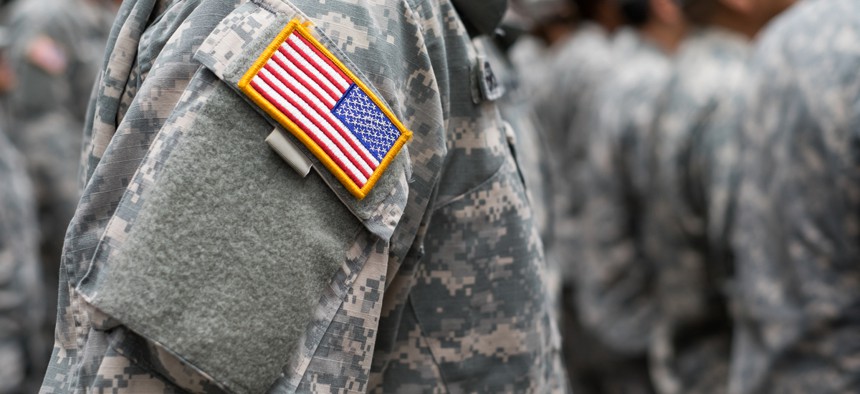In a County Jail, 'The Barracks' Aims to Give Veterans Resources and Hope

Veterans-only housing units are spread across the country in state prisons, federal penitentiaries and jails, according to the National Institute of Corrections. Shutterstock

Connecting state and local government leaders
At the Gwinnett County Jail in Georgia, inmates who previously served in the military can choose to join a veterans-only housing unit that offers structure and tailored programming.
Filling out intake paperwork at the Gwinnett County Jail, Dylan Antoine marked “yes” on a form that asked if he had served in the military. Weeks later, a deputy came and asked if he’d like to move to a new housing unit specifically for veterans.
“I talked to my mom first,” said Antoine, 22, who is in the northeastern Georgia jail awaiting arraignment on charges of armed robbery and aggravated assault. “She said it would be a good idea because of the structure, the discipline, kind of getting away from the wrong crowd, and she thought I could gain a lot of knowledge from the older people there.”
So Antoine made the move to "The Barracks," a 70-bed housing unit for veterans that opened in the Gwinnett County Jail in November. The Barracks looks the same as the jail's other housing units, but offers services and activities for veterans that are designed to handle trauma, establish routine and help inmates transition productively back to society.
“The Barracks program provides classes to address drug abuse, behavioral therapy, and the trauma associated with military service. Inmates assigned to these units maintain a regimented schedule that includes room inspections and military-style physical fitness training,” said Deputy Shannon Volkodav, a spokeswoman for the Gwinnett County Sheriff’s Office, which spearheaded the program. “Our goal is to help reconnect these inmates to the time in their lives when they made better decisions, respected authority and obeyed the law.”

Veteran-specific housing units have existed in United States detention centers since at least 2011, mostly in state-level facilities, according to the National Institute of Corrections. As of June, there were barracks in 73 state prisons, 43 local jails and three federal prisons, according to the agency.
Researchers cite a host of benefits for veterans in separate housing units, including consolidation of resources and the ability to provide therapy and programs designed to treat veteran-specific issues. The programs are designed to offer inmates the same sense of structure they had in the military, according to the NIC, which says they can lead to a “demonstrated reduction in disruptive incidents."
In Gwinnett County, officials hope the housing unit could help reduce recidivism rates among veterans who are arrested and going through the court system. Nationwide, little research has been done on that topic, although a National Institute of Justice evaluation of a veterans’ housing unit in San Diego found that inmates who opted into the program had fewer in-custody violations and lower rates of another conviction in the year after their release than veterans who stayed in the jail’s general population.
“We equip them with tools and resources and we hope that increases the likelihood that they will not return to our jail when they’re released,” Volkodav said. “That’s the ultimate goal. This is a program intended to help them make better choices in their personal lives when they’re not incarcerated so they don’t come back.”

In The Barracks, inmates—clad in special khaki-brown jail uniforms—are divided into squads, each with a deputy-appointed squad leader. Each squad does chores and activities as a group, including meals, briefings and military-style physical training. The mindset is different—more supportive, more positive, more goal-oriented—than in the jail’s general population, said Antoine, who served for two years in the Army National Guard.
“It’s just an awesome crowd. Everyone wants to see you do better and everyone is trying to do better,” he said. “Everyone is not really living the life to where they want to be doing wrong. They don’t speak about doing wrong things. It’s a real positive vibe in here. They try to lift you up and help you out. It’s more like how it is in the military, where everyone cares about each other.”
The targeted programs help as well, he said. Antoine left the military when his brother died and says he suffers from PTSD, anxiety and depression. He’s undergoing therapy for all three and also taking a parenting class in hopes of being a better father for his young daughter and a son, due in January. The overall experience, Antoine said, has made him newly proud of his military service and optimistic about the opportunities available to him once he’s free. He is not guilty of the crimes he was charged with, he said.
“I feel like they should put this in more jails,” he said. “Honestly, veterans do need help and I see the help these people are getting here. When I’m around them, I feel like I have people around, and I’m not feeling those lonely feelings that my depression gives me. This is an opportunity that needs to be spread everywhere, not just here.”
Kate Elizabeth Queram is a Staff Correspondent for Route Fifty and is based in Washington, D.C.

NEXT STORY: A New Bill In Pennsylvania Would Require Burial of ‘Fetal Remains’




